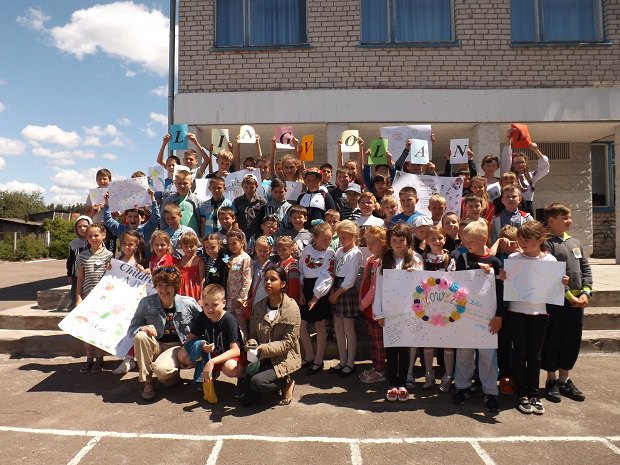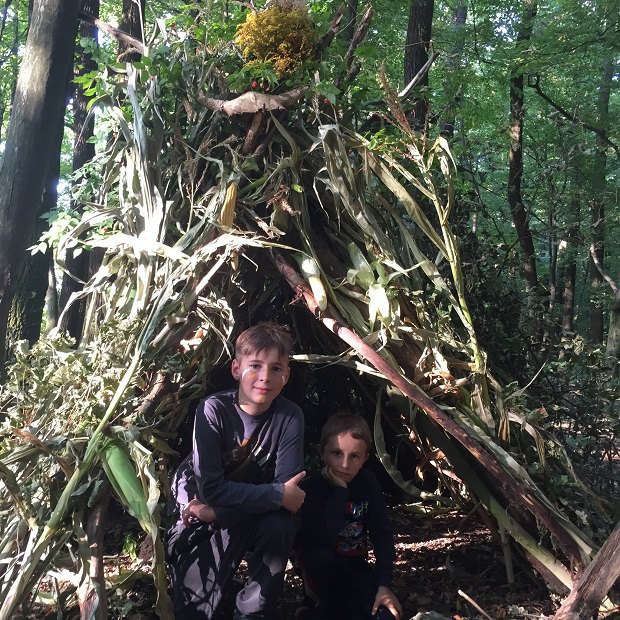Про досвід Олени та її сина можна прочитати в англомовному матеріалі, який було опубліковано на корпоративному порталі ЄБРР під заголовком «Do you want to be the first foreigner in a Ukrainian village?».

An EBRD bake sale in December raised over £800
Everybody who follows events in Ukraine has heard talk about a powerful volunteer movement. They are literally everywhere – including at the EBRD. Last summer, a remote village allowed Olena Borysova, an energy efficiency principal in Kyiv, to teach local children some English and to introduce her own son to village life, complete with roaming cattle and real food.
For kids in Luhansk and Donetsk, there is no option to invite an international volunteer for a summer English school. Ukrainian community in EBRD is conducting a fundraising for these children to travel to a summer camp vacation in central Ukraine, with English lessons and medical care. The new initiative, by a team of Ukrainians working at the EBRD, has already raised £3,800, including through a bake sale in December.
Everyone who is over 18 years old can also volunteer and go to a remote village to teach, which will be a life-changing experience. One of the GoCamp main aims is to mobilise volunteers to run summer English schools for Ukrainian kids in remote locations, where they have little chance to be exposed to other cultures and practice English.
How Olena’s son taught English and met the calf
As Olena Borysova discovered last summer, when she volunteered for GoCamp, most people in the village in the Zhytomyr region, 120 kilometres from the capital, had never been any further than their area’s administrative centre. Olena went with her 12-year-old son, Olexiy, who spent his first school year in upstate New York and speaks fluent English, and another volunteer, 20-year old Dia from India, a student of English from Calcutta. Dia spent a whole three weeks in the summer school.
They were the first speakers of real English to spend time and teach the village. (The school English teacher was also an enthusiastic learner at the summer school). And Dia was the first ever foreigner most of the village had a chance to befriend – although there had been a short visit earlier by some Peace Corps volunteers.
For the children, Olena says, the most memorable thing was meeting Olexiy. “I took him with me in order for the kids to meet and befriend somebody who is fluent in three languages. Kids his age were quite distrustful at first and kept trying to trip him up, but eventually became convinced that he was indeed fluent in English – and believed that they could be, too!”

lena, Olexiy and DIa (front) with their clever little pupils
Here is how Olena described their first days in a letter home.
“Our village is called Denishi. We were met at the local school, by children and teachers, in a traditional manner, with ritual bread and salt. We assumed we had to eat the bread and started chewing on it, but the head teacher took it away.”
“Upon arrival, we were reminded of the importance of packing skills. There are no toothbrushes on sale here. You have to go to the city of Zhytomyr, 22 km away. Olexiy is learning the ways of the village. He is impressed by how polite everybody is (local people greet you every time they meet you on the street), and is envious of the freedom his age-mates enjoy. At the end of lessons they just mount their bikes and ride anywhere they like without telling their parents where they are going and when they will be home. Having met a calf roaming the village streets, Olexiy is cautious not to scare it away and therefore prefers to keep at a safe distance. He says he’s never eaten tastier strawberries in his life.”
Olena, Olexiy and Dia had students in three age groups: 6-8, 9-12, and 13-15 year olds. More than 80 per cent of the school’s pupils enrolled into the summer camp. “Olexiy was given classes to teach as well. He taught them in all seriousness for two days, then got a little tired, spent a day running around with new friends his age and went back to teaching ‘his’ groups,” says Olena.
“Both the kids and local teachers participated, and they were very good students indeed, really interested and enthusiastic. Teaching aids were quite limited so we had to be creative – at one point I used a little video of my pets to discuss with the youngest kids in English whether cats and dogs can be friends. At the end of each day, the students were asked to draw little pictures representing the highlights of the day, and I still have one, saying: Olena – good; Dia – very good, Olexiy – the best!”

Volunteers stayed with local families and made new friends. All were sad when it was time to leave, especially Olexiy, and Dia said she would love to visit again from India. She was the first “real” foreigner most villagers have ever met, she taught the locals some Bollywood dancing, and learning about a new culture was great for both sides.
“I don’t know who benefited from our volunteering more: the school or us,” adds Olena. “It was so different from anything Olexiy has experienced before, and gave us such an amazing picture of how people live just in 100 miles from the capital city. I would wholeheartedly recommend to my colleagues who are keen to experience something very different, rewarding, and of practical value to Ukraine, that they participate in the GoCamp 2017 campaign – please feel free to ask me any questions at all.”
The main goal of the GoCamp programme is to educate a new young generation of Ukrainians, helping make them capable of lifelong learning, prepared for the challenges of the 21st century, fluent in foreign languages and open to other cultures and experiences.
The programme aims to involve 100,000 children from 700 schools in Ukraine and bring 1,000 international volunteers to Ukraine in 2017 alone. The ambition is to reach 1.5 million children by 2020.
Автор оригінальної версії — Світлана Пиркало. Редакція — Юлія Мішина.
